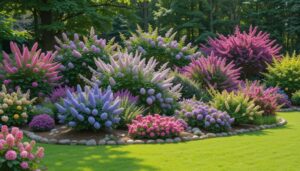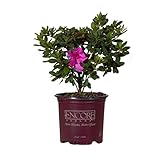This post may contain affiliate links. If you purchase through these links, I may receive a small commission at no cost to you. Learn more.
Flowering shrubs are one of the best ways to add long-lasting color, texture, and shape to your landscape. Whether you want bold blooms, seasonal interest, or something low-maintenance, there’s a shrub for every yard. These plants work great along fences, near entryways, or as foundation plantings. Some attract pollinators, others offer year-round structure, and many provide vibrant blooms from spring through fall. This guide covers 9 standout flowering shrubs that are easy to grow and bring serious beauty to your garden.
Last update on 2026-01-31 / Affiliate links / Images from Amazon Product Advertising API
Key Highlights
- Flowering shrubs add structure and color to your landscape
- Many are low-maintenance and bloom for months at a time
- Some attract pollinators like bees and butterflies
- Ideal for borders, privacy, or seasonal focal points
Hydrangea: Big Blooms, Big Impact
Hydrangeas are known for their large, round clusters of flowers in shades of pink, blue, or white. They bloom from summer to fall and prefer part shade and rich, well-drained soil. Some varieties, like ‘Endless Summer,’ can rebloom multiple times. These shrubs are perfect for beds near patios or in front-yard gardens where their blooms can shine.
Lilac: Classic Spring Fragrance
Lilacs offer fragrant, cone-shaped flowers in purple, white, or pink, and they bloom in mid to late spring. They need full sun and benefit from yearly pruning after flowering. Lilacs also attract butterflies and bees, making them a favorite for pollinator gardens.
Butterfly Bush: A Magnet for Pollinators
As the name suggests, butterfly bush brings in butterflies, bees, and hummingbirds. It blooms from summer to frost and is available in shades of purple, white, pink, and even yellow. These fast growers like full sun and well-drained soil. Deadheading spent blooms encourages even more flowering.
Azalea: Springtime Color Explosion
Azaleas offer vibrant flowers in shades of red, pink, white, and orange. They bloom mostly in spring and prefer partial shade and acidic soil. Choose evergreen or deciduous types depending on your landscape needs. Azaleas look stunning along borders or as mass plantings.
Forsythia: The First Bloom of Spring
Forsythia is one of the earliest blooming shrubs, producing bright yellow flowers before its leaves even emerge. It grows fast and prefers full sun. Once established, it needs little care and creates an eye-catching hedge or backdrop.
Rose of Sharon: A Summer Showstopper
Rose of Sharon (a type of hardy hibiscus) blooms through late summer into fall, offering tropical-looking flowers in pink, purple, blue, or white. These upright shrubs grow tall and are great for privacy screens or garden focal points. They tolerate a variety of soils and love the sun.
Spirea: Soft Blooms and Easy Care
Spirea shrubs produce clusters of tiny flowers in late spring or summer depending on the variety. They’re low-maintenance, drought-tolerant, and thrive in full sun. Some types also offer beautiful fall leaf color. Spirea is great for low borders or foundation plantings.
Camellia: Fall and Winter Blooms
Camellias bloom when little else does—in fall, winter, or early spring, depending on the variety. Their glossy evergreen leaves and rose-like flowers make them a standout. Camellias prefer partial shade and moist, acidic soil. They grow well in sheltered spots or as anchor plants in shaded beds.
Weigela: Nonstop Spring and Summer Flowers
Weigela is a compact shrub that produces funnel-shaped blooms in shades of red, pink, and white. Many varieties are rebloomers, meaning they’ll flower again after the first flush. They attract hummingbirds and work well in borders or as standalone accents.
Top 9 Flowering Shrubs for Your Garden
| Shrub | Bloom Season | Sun Needs | Flower Colors |
|---|---|---|---|
| Hydrangea | Summer–Fall | Part shade | Pink, blue, white |
| Lilac | Spring | Full sun | Purple, pink, white |
| Butterfly Bush | Summer–Frost | Full sun | Purple, white, pink |
| Azalea | Spring | Partial shade | Red, pink, orange |
| Forsythia | Early spring | Full sun | Bright yellow |
| Rose of Sharon | Late summer–Fall | Full sun | Blue, pink, white |
| Spirea | Spring or summer | Full sun | White, pink, red |
| Camellia | Fall–Winter | Partial shade | Red, white, pink |
| Weigela | Spring–Summer | Full sun | Pink, red, white |
Tips for Planting and Maintaining Flowering Shrubs
When planting shrubs, be sure to choose the right spot based on their sunlight and soil needs. Dig a hole twice as wide as the root ball, but not deeper. Water well after planting, and mulch around the base to retain moisture.
Prune after the plant finishes blooming—this encourages better growth and more flowers the next season. Fertilize in early spring with a balanced plant food unless the shrub prefers acidic soil, in which case choose a specific fertilizer.
Mix and match different bloom times so your yard has flowers from early spring through fall. Use evergreen shrubs like camellia or azalea for year-round structure.
Final Thoughts
Flowering shrubs add bold color, texture, and structure to any outdoor space. With varieties that bloom in every season, you can enjoy year-round beauty without a ton of maintenance. Choose the shrubs that best match your sunlight, soil, and garden style. Whether you’re planting for privacy, pollinators, or pure curb appeal, these nine flowering shrubs are sure to impress.
- Hardiness Zone 4-9
- Sun - Partial Shade
- REBLOOMING EVERGREEN SHRUB: Encore Azalea Autumn Royalty is a reblooming purple azalea that will give you months of beauty instead of weeks. Once they have bloomed, the first thing you will notice is...
- PINK FLOWERING BUSH: The Encore Azalea Autumn Royalty can be used as a focal point around the yard and garden to accentuate entries with their dense growth habit. In the spring, summer, and fall, the...
- Lush Lavender at Home: Cultivate your own serene lavender garden with our English Lavender seeds, ensuring fresh, fragrant blooms right at your fingertips. Ideal for both beginners and seasoned...
- Superior Germination Rates: Experience a high success rate with our non-GMO, heirloom seeds, sourced in the USA for your peace of mind and gardening success. 1500 seeds for plentiful planting! Elevate...
Last update on 2026-01-31 / Affiliate links / Images from Amazon Product Advertising API






